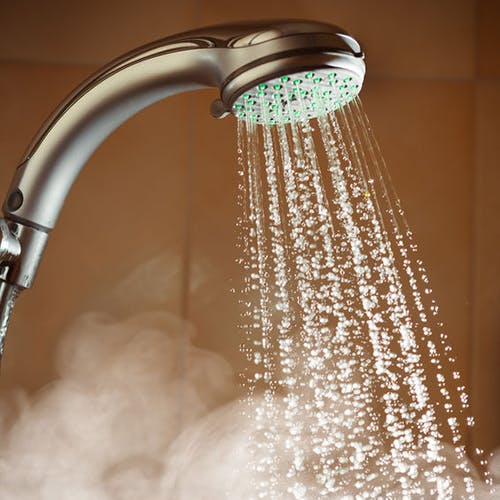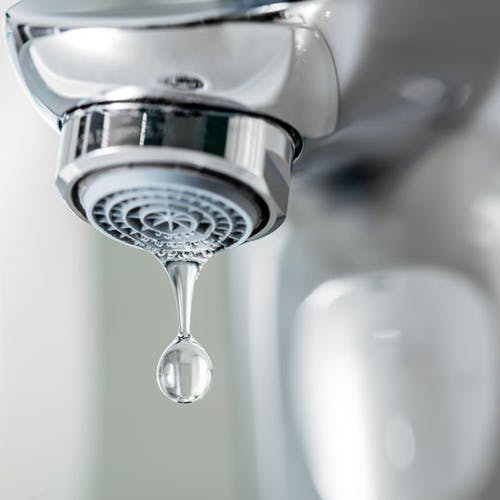As temperatures in the UK reach record levels and rain fall seems like a distant memory, talk inevitably turns to hosepipe bans. Ireland has already imposed one and many utility companies in the UK are said to be considering one if we don’t get some significant rain soon. Everyone doing their bit to save water then is a good idea, not just now in very dry weather but all year round as it’s better for the environment and, if you have a water meter in your home, it would save you money.
Here are some great tips to help you conserve water, most of which can easily be implemented just by small changes in behaviour. We’ve grouped them into Bathing, Plumbing, Kitchen and Garden.

Take showers rather than baths but be aware that some power showers can actually use more water than baths. Swap to an efficient shower head to use less water
Limit shower time – every minute in a power shower uses 17 litres of water. Try to limit your shower to 4 minutes if you can
Don’t run taps while cleaning teeth – this can use up to 6 litres of water a minute
Capture any water you run off while waiting for water to heat up to wash your hands or face. You can then use this to water the garden or store in the fridge for drinking

Fix leaky taps – there could be up to 60 litres of water going down the drain every week
Switch to a low flush toilet – the average household uses around 5,000 litres of water a year. A dual flush toilet uses just 4 litres for a reduced flush or 6 litres for a full flush compared to a traditional toilet flush. If you have a traditional flush toilet you can add a cistern displacement device (CDD) to the cistern to reduce the amount of water used
Check pipes for leaks and drains for blockages and resolve before you have a flood. Also make sure you know where your stop tap is and that you can both access it and turn it in the event of an emergency. If you can’t, consider getting a Sure Stop remote stop tap installed
Look out for leaky toilets. This is where water leaks slowly from the cistern into the toilet bowl in between flushes. You can check by adding some food colouring to the water in the cistern and don’t flush for an hour or so. If the colour appears in the toilet bowl you know you have a leak. This is one of the most common reasons for high water usage. A plumber would be able to fix that
Yorkshire Water offers free water saving kits that include a CDD, a tap aerator, a ShowerSave to limit water and even a 4 minute shower timer. Claim yours here.

Don’t fill the kettle right up every time, only boil what you need. This saves power as well as reduces loss through steam
When cooking with water consider ways to use less such as steaming vegetables rather than boiling. Also save any used water as it can be used as stock for soups or to water the garden once cooled
Make sure you fully load the washing machine and the dishwasher every time as they’ll use the same amount of water whether they are full or half empty. Dishwashers actually use less water than washing up by hand. Consider using eco programmes if available
If you want cold drinking water fill up bottles and put them in the fridge rather than wasting water waiting for it to run cold from the tap

Add things to flower borders that will use water more efficiently: water beads (such as the ones we warned about putting down drains in a recent blog!) or water saving gels will store and release water over time and mulch and bark will stop water evaporating as quickly in hot weather
Water the garden when it’s cool, such as first thing in the morning or in the evening as a lot of the water will evaporate in full heat and you won’t get as much benefit
Install a water butt in the garden to collect rain water and use it for the garden. This could save 5000 litres per year and is better for plants than treated tap water
When watering the garden, watering cans are better than hosepipes and hosepipes (especially those with a trigger nozzle) are better than automatic sprinklers which can uses 1000 litres an hour!
Try cutting off the bottom of a plastic bottle and push into the soil upside down. This will then capture rain water and continue to drain into the soil slowly
Check for outdoor leaks by looking for moist areas of grass or soil when it hasn’t been raining. If you do find one, contact a plumber
If you do have any worries about leaks or would like any plumbing jobs attending to then please give us a call on 0333 577 0151 or complete the enquiry form opposite.
For more water saving tips see Friends of the Earth or Waterwise.
Complete the form below and one of the Plumbcare.com team will get back to you as soon as possible.






"Excellent service, efficient and polite great job."